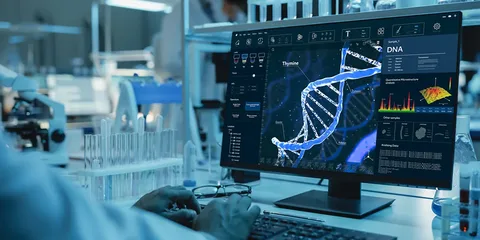Bioinformatics, a multidisciplinary field at the intersection of biology and computational science, holds the promise of unlocking the vast mysteries encoded within genomes. As our understanding of genomics deepens, bioinformatics emerges as a crucial tool, transforming the way we approach biological research, healthcare, and the exploration of life’s intricacies. This article explores the multifaceted promise of bioinformatics, from decoding genomes to advancing personalized medicine.
Deciphering the Genetic Code
Bioinformatics plays a pivotal role in the era of genomics by facilitating the analysis of vast amounts of genetic data. Technological advancements in genomic sequencing, coupled with bioinformatics algorithms, enable the deciphering of entire genomes. This capability has led to breakthroughs in understanding genetic variations, evolution, and the genetic basis of diseases.
Personal Genomics and Precision Medicine
The promise of bioinformatics extends to personalized medicine, where an individual’s genomic information informs tailored medical interventions. Bioinformatics tools analyze genetic data to identify predispositions to diseases, optimize drug treatments, and personalize healthcare plans. This shift towards precision medicine holds the potential to revolutionize patient outcomes.
Big Data Analytics in Biology
Bioinformatics handles vast datasets generated from various biological experiments. Big data analytics, powered by bioinformatics algorithms, extract meaningful patterns and insights from this wealth of information. This analytical prowess accelerates discoveries in fields such as functional genomics, systems biology, and evolutionary biology.
Understanding Complex Biological Systems
The complexity of biological systems, from cellular interactions to ecosystem dynamics, necessitates advanced computational approaches. Bioinformatics models and simulations unravel the intricacies of biological processes, shedding light on the mechanisms governing life. This understanding contributes to advancements in agriculture, environmental conservation, and biotechnology.
Advancements in Drug Discovery
Bioinformatics accelerates drug discovery through in silico drug design. Computational models analyze biological data to predict drug interactions, optimize molecular structures, and identify potential drug candidates. This approach expedites the drug development pipeline, reducing costs and increasing the likelihood of discovering novel therapeutics.
Targeted Therapies and Biomarkers
Identifying specific biomarkers associated with diseases is a bioinformatics-driven endeavor. This knowledge enables the development of targeted therapies tailored to individual patients. Bioinformatics tools analyze molecular profiles to pinpoint biomarkers, ushering in an era of precision medicine where treatments are finely tuned to the genetic makeup of each patient.
Data Privacy and Security
As bioinformatics deals with sensitive genetic information, ensuring data privacy and security is paramount. Robust ethical frameworks and secure data storage systems are essential to protect individuals’ genetic data from unauthorized access and misuse.
Ethical Use of Genetic Information
The ethical use of genetic information raises concerns about potential discrimination, stigmatization, and unintended consequences. Bioinformatics practitioners must adhere to ethical guidelines to safeguard individuals’ rights and prevent the misuse of genetic data in healthcare and beyond.
Single-Cell Genomics
Advancements in single-cell genomics, coupled with bioinformatics, enable the study of individual cells with unprecedented resolution. This technology promises insights into cellular heterogeneity, developmental processes, and disease mechanisms, opening new avenues for targeted interventions.
Integration with Artificial Intelligence (AI)
The integration of bioinformatics with AI holds transformative potential. Machine learning algorithms can analyze complex biological data more efficiently, uncovering hidden patterns and predicting novel associations. This synergy enhances the speed and accuracy of biological discoveries.
Conclusion
The promise of bioinformatics lies in its ability to unravel the secrets encoded in the intricate language of genomes. From advancing our understanding of genetics to revolutionizing drug discovery and healthcare, bioinformatics is a catalyst for progress in the life sciences. As technology continues to evolve, bioinformatics stands as a beacon, guiding us towards a future where the mysteries of life are decoded, leading to better health outcomes and a deeper appreciation of the wonders of biology.
FAQs
What role does bioinformatics play in genomics?
Bioinformatics plays a crucial role in genomics by facilitating the analysis of vast amounts of genetic data. It enables the deciphering of entire genomes, leading to breakthroughs in understanding genetic variations, evolution, and the genetic basis of diseases.
How does bioinformatics contribute to personalized medicine?
Bioinformatics contributes to personalized medicine by analyzing genetic data to inform tailored medical interventions. This includes identifying predispositions to diseases, optimizing drug treatments, and personalizing healthcare plans based on an individual’s genomic information.
What is the significance of big data analytics in bioinformatics?
Big data analytics in bioinformatics extracts meaningful patterns and insights from vast biological datasets. This analytical prowess accelerates discoveries in functional genomics, systems biology, and evolutionary biology, enhancing our understanding of complex biological systems.
How does bioinformatics accelerate drug discovery?
Bioinformatics accelerates drug discovery through in silico drug design. Computational models analyze biological data to predict drug interactions, optimize molecular structures, and identify potential drug candidates. This approach expedites the drug development pipeline and increases the likelihood of discovering novel therapeutics.

